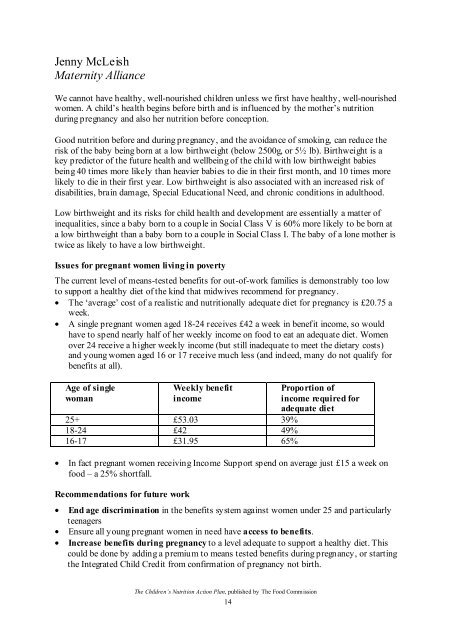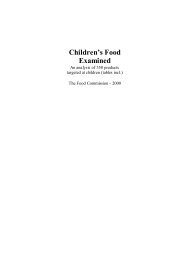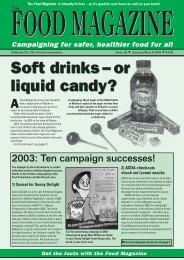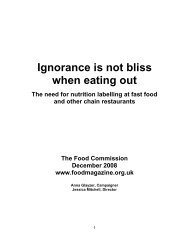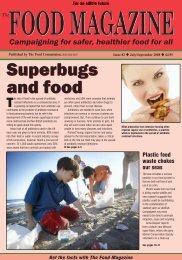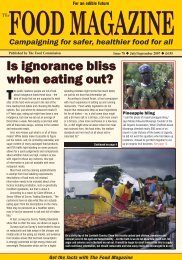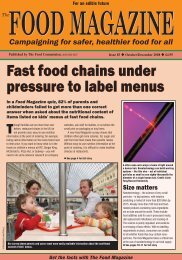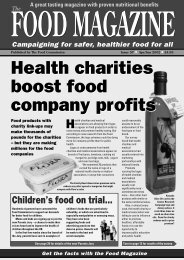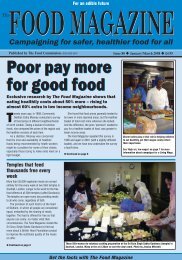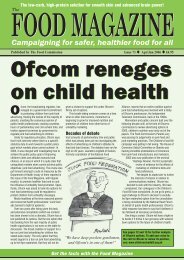Children's Nutrition Action Plan - The Food Commission
Children's Nutrition Action Plan - The Food Commission
Children's Nutrition Action Plan - The Food Commission
You also want an ePaper? Increase the reach of your titles
YUMPU automatically turns print PDFs into web optimized ePapers that Google loves.
Jenny McLeish<br />
Maternity Alliance<br />
We cannot have healthy, well-nourished children unless we first have healthy, well-nourished<br />
women. A child’s health begins before birth and is influenced by the mother’s nutrition<br />
during pregnancy and also her nutrition before conception.<br />
Good nutrition before and during pregnancy, and the avoidance of smoking, can reduce the<br />
risk of the baby being born at a low birthweight (below 2500g, or 5½ lb). Birthweight is a<br />
key predictor of the future health and wellbeing of the child with low birthweight babies<br />
being 40 times more likely than heavier babies to die in their first month, and 10 times more<br />
likely to die in their first year. Low birthweight is also associated with an increased risk of<br />
disabilities, brain damage, Special Educational Need, and chronic conditions in adulthood.<br />
Low birthweight and its risks for child health and development are essentially a matter of<br />
inequalities, since a baby born to a couple in Social Class V is 60% more likely to be born at<br />
a low birthweight than a baby born to a couple in Social Class I. <strong>The</strong> baby of a lone mother is<br />
twice as likely to have a low birthweight.<br />
Issues for pregnant women living in poverty<br />
<strong>The</strong> current level of means-tested benefits for out-of-work families is demonstrably too low<br />
to support a healthy diet of the kind that midwives recommend for pregnancy.<br />
• <strong>The</strong> ‘average’ cost of a realistic and nutritionally adequate diet for pregnancy is £20.75 a<br />
week.<br />
• A single pregnant women aged 18-24 receives £42 a week in benefit income, so would<br />
have to spend nearly half of her weekly income on food to eat an adequate diet. Women<br />
over 24 receive a higher weekly income (but still inadequate to meet the dietary costs)<br />
and young women aged 16 or 17 receive much less (and indeed, many do not qualify for<br />
benefits at all).<br />
Age of single<br />
woman<br />
Weekly benefit<br />
income<br />
25+ £53.03 39%<br />
18-24 £42 49%<br />
16-17 £31.95 65%<br />
Proportion of<br />
income required for<br />
adequate diet<br />
• In fact pregnant women receiving Income Support spend on average just £15 a week on<br />
food – a 25% shortfall.<br />
Recommendations for future work<br />
• End age discrimination in the benefits system against women under 25 and particularly<br />
teenagers<br />
• Ensure all young pregnant women in need have access to benefits.<br />
• Increase benefits during pregnancy to a level adequate to support a healthy diet. This<br />
could be done by adding a premium to means tested benefits during pregnancy, or starting<br />
the Integrated Child Credit from confirmation of pregnancy not birth.<br />
<strong>The</strong> Children’s <strong>Nutrition</strong> <strong>Action</strong> <strong>Plan</strong>, published by <strong>The</strong> <strong>Food</strong> <strong>Commission</strong><br />
14


